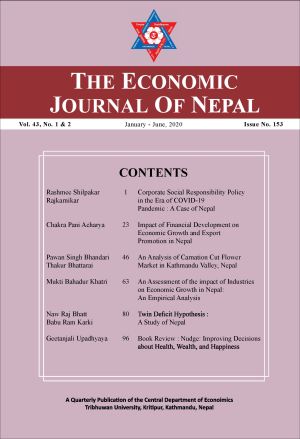Corporate Social Responsibility Policy in the Era of COVID-19 Pandemic: A Case of Nepal
DOI:
https://doi.org/10.3126/ejon.v43i1-2.48023Keywords:
Corporate Social Responsibiility (CSR), Mandatory, COVID-19, PandemicAbstract
The COVID-19 pandemic is the greatest global challenge faced since World War II. Nepal saw first COVID-19 infected case on 24th March, 2020. COVID-19 had already impacted in the human tragedy. The unique effect of the COVID-19 pandemic is that it once again forcefully pushed societal inequalities into public consciousness. It has provided both challenges as well as opportunities to companies and organizations with regard to their Corporate Social Responsibility (CSR). Mandatory CSR could work fulfil the gap wide range of stakeholders’ needs created by the pandemic. This paper aims at investigating the rationale for the mandatory CSR in the era of Post COVID - 19 and contribute the CSR laws to direct how the law can prevent harms to the society beyond philanthropic initiative. The method adopted in this paper is the theoretical review of contextual pandemic situation, policy responses, the mandatory CSR policy of Nepal and other countries. The result shows that the mandatory CSR is humanitarian focused in the west and development in the east. Almost all the CSR laws are drafted with political interest thus, are not supported by regulatory and monitoring mechanism to measure the adequacy of implementation as per the legal requirements. Fighting against such pandemics will call for a joint effort of the corporate sector, government, and the stakeholders (including pandemic effected), and achieving readiness for corporate social responsibility.
Downloads
Downloads
Published
How to Cite
Issue
Section
License
© Cedecon-TU




